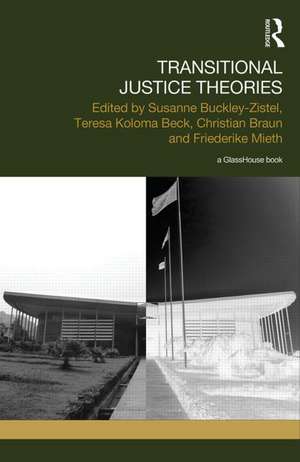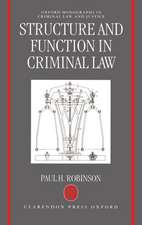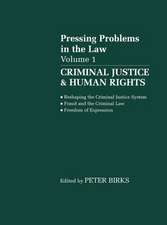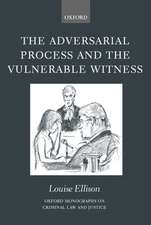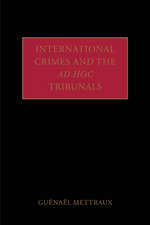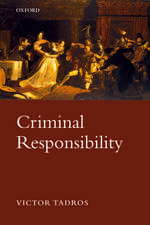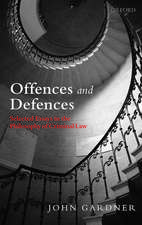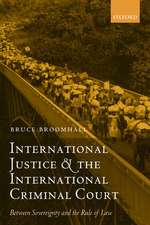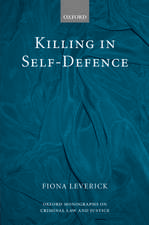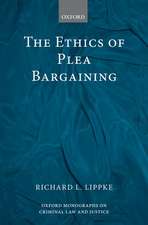Transitional Justice Theories: Transitional Justice
Editat de Susanne Buckley-Zistel, Teresa Koloma Beck, Christian Braun, Friederike Miethen Limba Engleză Hardback – 4 oct 2013
This book will be of particular interest for scholars and students of law, peace and conflict studies, and human rights studies. Even though highly theoretical, the chapters provide an easy read for a wide audience including readers not familiar with theoretical investigations.
| Toate formatele și edițiile | Preț | Express |
|---|---|---|
| Paperback (1) | 444.62 lei 6-8 săpt. | |
| Taylor & Francis – 9 iun 2015 | 444.62 lei 6-8 săpt. | |
| Hardback (1) | 1059.84 lei 6-8 săpt. | |
| Taylor & Francis – 4 oct 2013 | 1059.84 lei 6-8 săpt. |
Din seria Transitional Justice
- 9%
 Preț: 936.84 lei
Preț: 936.84 lei -
 Preț: 330.37 lei
Preț: 330.37 lei -
 Preț: 189.54 lei
Preț: 189.54 lei - 15%
 Preț: 289.21 lei
Preț: 289.21 lei - 18%
 Preț: 999.82 lei
Preț: 999.82 lei -
 Preț: 413.33 lei
Preț: 413.33 lei -
 Preț: 446.37 lei
Preț: 446.37 lei - 18%
 Preț: 1000.27 lei
Preț: 1000.27 lei -
 Preț: 449.41 lei
Preț: 449.41 lei - 26%
 Preț: 847.73 lei
Preț: 847.73 lei - 14%
 Preț: 312.77 lei
Preț: 312.77 lei - 19%
 Preț: 268.10 lei
Preț: 268.10 lei -
 Preț: 409.48 lei
Preț: 409.48 lei -
 Preț: 413.33 lei
Preț: 413.33 lei - 18%
 Preț: 1057.57 lei
Preț: 1057.57 lei -
 Preț: 413.33 lei
Preț: 413.33 lei -
 Preț: 489.26 lei
Preț: 489.26 lei -
 Preț: 389.38 lei
Preț: 389.38 lei -
 Preț: 487.37 lei
Preț: 487.37 lei -
 Preț: 413.33 lei
Preț: 413.33 lei -
 Preț: 469.34 lei
Preț: 469.34 lei -
 Preț: 407.57 lei
Preț: 407.57 lei -
 Preț: 462.60 lei
Preț: 462.60 lei -
 Preț: 434.41 lei
Preț: 434.41 lei -
 Preț: 485.46 lei
Preț: 485.46 lei -
 Preț: 439.43 lei
Preț: 439.43 lei - 18%
 Preț: 1117.43 lei
Preț: 1117.43 lei - 18%
 Preț: 1060.25 lei
Preț: 1060.25 lei - 26%
 Preț: 764.20 lei
Preț: 764.20 lei -
 Preț: 444.62 lei
Preț: 444.62 lei - 18%
 Preț: 1062.62 lei
Preț: 1062.62 lei
Preț: 1059.84 lei
Preț vechi: 1292.49 lei
-18% Nou
Puncte Express: 1590
Preț estimativ în valută:
202.79€ • 211.74$ • 167.84£
202.79€ • 211.74$ • 167.84£
Carte tipărită la comandă
Livrare economică 04-18 aprilie
Preluare comenzi: 021 569.72.76
Specificații
ISBN-13: 9780415822107
ISBN-10: 0415822106
Pagini: 240
Ilustrații: 1 black & white illustrations, 1 black & white tables
Dimensiuni: 156 x 234 x 18 mm
Greutate: 0.6 kg
Ediția:New.
Editura: Taylor & Francis
Colecția Routledge
Seria Transitional Justice
Locul publicării:Oxford, United Kingdom
ISBN-10: 0415822106
Pagini: 240
Ilustrații: 1 black & white illustrations, 1 black & white tables
Dimensiuni: 156 x 234 x 18 mm
Greutate: 0.6 kg
Ediția:New.
Editura: Taylor & Francis
Colecția Routledge
Seria Transitional Justice
Locul publicării:Oxford, United Kingdom
Public țintă
General, Postgraduate, and ProfessionalCuprins
Transitional Justice Theories: An Introduction Part One: Theorizing Transitional Justice Chapter 1 Transformative Justice, Reconciliation, and Peacebuilding Chapter 2 Rethinking Reconciliation in Divided Societies: A Social Learning Theory of Transitional Justice Chapter 3 The Plural Justice Aims of Reparations Chapter 4 Political Liberalism after Mass Violence: John Rawls and a ‘Theory’ of Transitional Justice Chapter 5 The Vertical and Horizontal Expansion of Transitional Justice: Explanations and Implications for a Contested Field Part Two Exploring the Limits of Transitional Justice Chapter 6 Bargaining Justice: A Theory of Transitional Justice Compliance Chapter 7 Narrative Truths: On the Construction of the Past in Truth Commissions Chapter 8 Redressive Politics and the Nexus of Trauma, Transitional Justice, and Reconciliation Chapter 9 Forgetting the Embodied Past: Body Memory in Transitional Justice Chapter 10 Understanding the Political Economy of Transitional Justice: A Critical Theory Perspective
Recenzii
"The breadth of contributions and the variety of approaches make Transitional Justice Theories a thought-provoking book and an important resource for those interested in the theoretical aspect of transitional justice"
- Marcos Zunnio, Queens College Cambridge, UK
"This volume covers an impressive breadth of conceptual discussion of transitional justice."
-Rita Shackel, Current Issues in Criminal Justice
"Overall, Transitional Justice Theories is packed with consistently informative, engaging, and thought-provoking essays that are sure to grab the attention of anyone interested in justice on an international scale. The fact that the volume approaches transitional justice theory and its problems from a multi-disciplinary standpoint ensures a greater potential for the proliferation of discourse within this area that is able to respond to the issues raised by the authors. The book's authors refrain from attempts at drawing conclusions to theoretical transitional justice, and instead issues are often left open to the interpolation of alternative or less congenial ways of thinking about the dominance of Western legal discourse within the transitional justice framework, offering the opportunity for further scholarly discussion and development."
-Pedram Esfandiary, Nottingham Trent University, Internet Journal of Criminology
- Marcos Zunnio, Queens College Cambridge, UK
"This volume covers an impressive breadth of conceptual discussion of transitional justice."
-Rita Shackel, Current Issues in Criminal Justice
"Overall, Transitional Justice Theories is packed with consistently informative, engaging, and thought-provoking essays that are sure to grab the attention of anyone interested in justice on an international scale. The fact that the volume approaches transitional justice theory and its problems from a multi-disciplinary standpoint ensures a greater potential for the proliferation of discourse within this area that is able to respond to the issues raised by the authors. The book's authors refrain from attempts at drawing conclusions to theoretical transitional justice, and instead issues are often left open to the interpolation of alternative or less congenial ways of thinking about the dominance of Western legal discourse within the transitional justice framework, offering the opportunity for further scholarly discussion and development."
-Pedram Esfandiary, Nottingham Trent University, Internet Journal of Criminology
Descriere
Transitional Justice Theories is the first volume to approach the politically sensitive subject of post-conflict or post-authoritarian justice from a theoretical perspective. It combines contributions from distinguished scholars and practitioners as well as from emerging academics from different disciplines and provides an overview of conceptual approaches to the field. The volume seeks to refine our understanding of transitional justice by exploring often unarticulated assumptions that guide discourse and practice. This book will be of particular interest for scholars and students of law, peace and conflict studies, and human rights studies. Even though highly theoretical, the chapters provide an easy read for a wide audience including readers not familiar with theoretical investigations.
